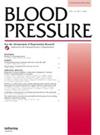直立性低血压与认知和中风之间的关系:前瞻性队列研究的荟萃分析
IF 2.3
4区 医学
Q2 PERIPHERAL VASCULAR DISEASE
引用次数: 5
摘要
摘要目的:许多研究表明,直立性低血压(OH)可能是痴呆和脑卒中的危险因素,但结果并不一致。为了进一步确定OH与认知或中风之间的联系,进行了荟萃分析。方法:检索中国生物医学数据库、PubMed、Web of Science和Cochrane图书馆数据库(截至2019年3月),以确定前瞻性队列研究,这些研究考察了成年人群中OH与中风和痴呆风险之间的关系。进行亚组分析和元回归分析以确定异质性的来源。我们还采用Begg检验和Egger检验来评估发表偏倚。结果:共纳入3490篇文献,最终纳入18项前瞻性观察性队列研究。在这些研究中,8项前瞻性研究是关于中风的,9项研究是关于认知的,一项研究报告了中风和痴呆的数据。meta分析显示,OH与认知不良之间存在相关性(风险比(HR): 1.18, 95%可信区间(CI): 1.03-1.35, I2 = 69.5%)。对于痴呆,合并HR为1.30,95% CI: 1.14-1.48, I2 = 31.0%。此外,我们发现OH与较高的卒中风险相关(HR: 1.36, 95% CI = 1.17-1.57, I2 = 67.3%)。未发现发表偏倚。结论:该荟萃分析提供了OH与认知能力下降相关的证据。OH导致痴呆风险增加30%,中风风险增加36%。本文章由计算机程序翻译,如有差异,请以英文原文为准。
The association between orthostatic hypotension and cognition and stroke: a meta-analysis of prospective cohort studies
Abstract Purposes: Many studies have indicated that orthostatic hypotension (OH) may be a risk factor for dementia and stroke, but the results have been inconsistent. To further ascertain the links between OH and cognition or stroke, a meta-analysis was performed. Methods: The Chinese Biomedical Database, PubMed, Web of Science, and the Cochrane Library database were searched (up to March 2019) to identify prospective cohort studies that examined the associations between OH and the risks of stroke and dementia among adult populations. Subgroup analyses and meta-regression analyses were conducted to identify sources of heterogeneity. We also performed Begg’s test and Egger’s test to assess publication bias. Results: A total of 3490 articles were identified, and 18 prospective observational cohort studies were ultimately included. Among these studies, eight prospective studies were about stroke, nine studies were about cognition and one study reported data about both stroke and dementia. Meta-analysis revealed an association between OH and worse cognition (hazard ratio (HR): 1.18, 95% confidence interval (CI): 1.03–1.35, I2 = 69.5%). For dementia, the pooled HR was 1.30, with 95% CI: 1.14–1.48, I2 = 31.0%. In addition, we found that OH was associated with a higher risk of stroke (HR: 1.36, 95% CI = 1.17–1.57, I2 = 67.3%). No publication bias was detected. Conclusion: This meta-analysis provides evidence that OH was associated with worse cognition. OH accounted for a 30% increase in the risk of dementia and a 36% increase in the risk of stroke.
求助全文
通过发布文献求助,成功后即可免费获取论文全文。
去求助
来源期刊

Blood Pressure
医学-外周血管病
CiteScore
3.00
自引率
5.60%
发文量
41
审稿时长
6-12 weeks
期刊介绍:
For outstanding coverage of the latest advances in hypertension research, turn to Blood Pressure, a primary source for authoritative and timely information on all aspects of hypertension research and management.
Features include:
• Physiology and pathophysiology of blood pressure regulation
• Primary and secondary hypertension
• Cerebrovascular and cardiovascular complications of hypertension
• Detection, treatment and follow-up of hypertension
• Non pharmacological and pharmacological management
• Large outcome trials in hypertension.
 求助内容:
求助内容: 应助结果提醒方式:
应助结果提醒方式:


